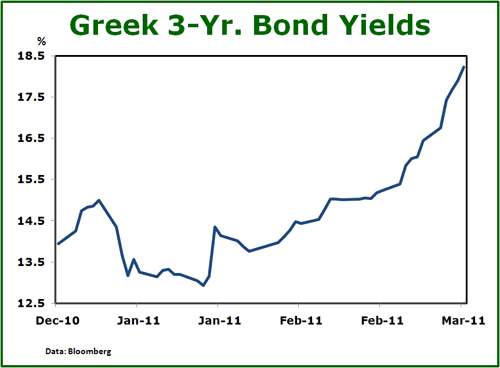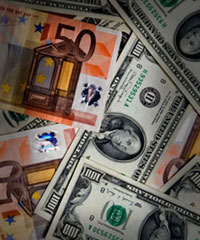E.U. Politicians Seek to Unload PIIGS Bonds
Interest-Rates / Global Debt Crisis Mar 16, 2011 - 10:10 AM GMTBy: Claus_Vogt
 Since last Friday all eyes have been geared toward the catastrophe in Japan. That’s indeed understandable. However, there has been another important development with far-reaching implications that is worth discussing today …
Since last Friday all eyes have been geared toward the catastrophe in Japan. That’s indeed understandable. However, there has been another important development with far-reaching implications that is worth discussing today …
While the media was totally focused on the Japanese disaster, German Chancellor Merkel and her European brethren insidiously decided to make a major change within the European Financial Stability Facility (EFSF), the EU’s euro rescue fund …
That change will let the European Central Bank (ECB) stop buying sovereign bonds from debt-ridden PIIGS countries like Greece. And it could transfer all those bonds it’s currently holding to the EFSF.
The decision came as a major surprise, since discussions of this controversial topic were officially scheduled to take place at the end of March.
So why now?
There Could Be Two Reasons …
First of all, the European bond market started sending stress signals again. As you can see in the chart below, interest rates of Greek 3-year government bonds shot up from 13 percent in January to 18 percent by March 10.

And last week Portugal was forced to borrow money at 5.99 percent, up nearly 2 percentage points since September — an unbearable leap.
These renewed bond market turbulences may have been an important driver for this emergency summit.
But there could be a second, more cynical explanation for the timing …
German Chancellor Merkel faces some important elections. And the concept of Germany as the main paymaster for troubled PIIGS is very unpopular amongst German tax payers.
And then German Finance Minister Schäuble said that the EFSF was too small and had to be increased.
Consequently, the EFSF’s funding was increased from $347.5 billion to $611.5 billion. Plus, it will now be allowed to buy bonds directly from ailing European governments. To crown this outgrowth of stupidity, it comes without any coercive rule to detain former and probably future sinners from further fiscal recklessness.
Incentive for Profligacy Leads to More Inflation
Unrestricted bailouts lead to more profligacy, more government debt, more inflation, and finally to more hardship somewhere down the road. There is absolutely no incentive for any politician to return to prudent policies. And the prudent ones will be punished since they will have to pay the bills of their imprudent brethrens.
European politicians have just decided to dig deeper into the hole they find themselves trapped in. And a return to prudent fiscal and monetary policies has become even less likely than it was before.
|
By taking on more debt, Europe is following in the U.S.’s footsteps, which will lead to a weaker euro, higher inflation and rising interest rates.
So unfortunately the euro is no alternative to the equally beleaguered dollar. And European sovereign debt bonds are no better than longer-term U.S. Treasuries. They both seem to be doomed.
All of this tells me that interest rates are sure to rise — both in Europe and in the U.S. And I have two ways you can use to potentially profit …
The first, is with ProShares UltraShort 20+ Year Treasury ETF (TBT). This fund seeks daily investment results that correspond to twice the inverse of the daily performance of the Barclays Capital 20+ Year U.S. Treasury Bond Index. That means for every 1 percent the index drops, TBT is designed to rise 2 percent.
And the second, learn more critical background information about money printing, asset bubbles, opportunistic central bankers, and government debt and what this all means for your financial health. I suggest you get a copy of my new book, The Global Debt Trap. Click on your choice of bookseller to order it online — Amazon, Barnes & Noble or Books-A-Million — or stop by your nearest bookstore.
Best wishes,
Claus
This investment news is brought to you by Money and Markets. Money and Markets is a free daily investment newsletter from Martin D. Weiss and Weiss Research analysts offering the latest investing news and financial insights for the stock market, including tips and advice on investing in gold, energy and oil. Dr. Weiss is a leader in the fields of investing, interest rates, financial safety and economic forecasting. To view archives or subscribe, visit http://www.moneyandmarkets.com.
© 2005-2022 http://www.MarketOracle.co.uk - The Market Oracle is a FREE Daily Financial Markets Analysis & Forecasting online publication.




